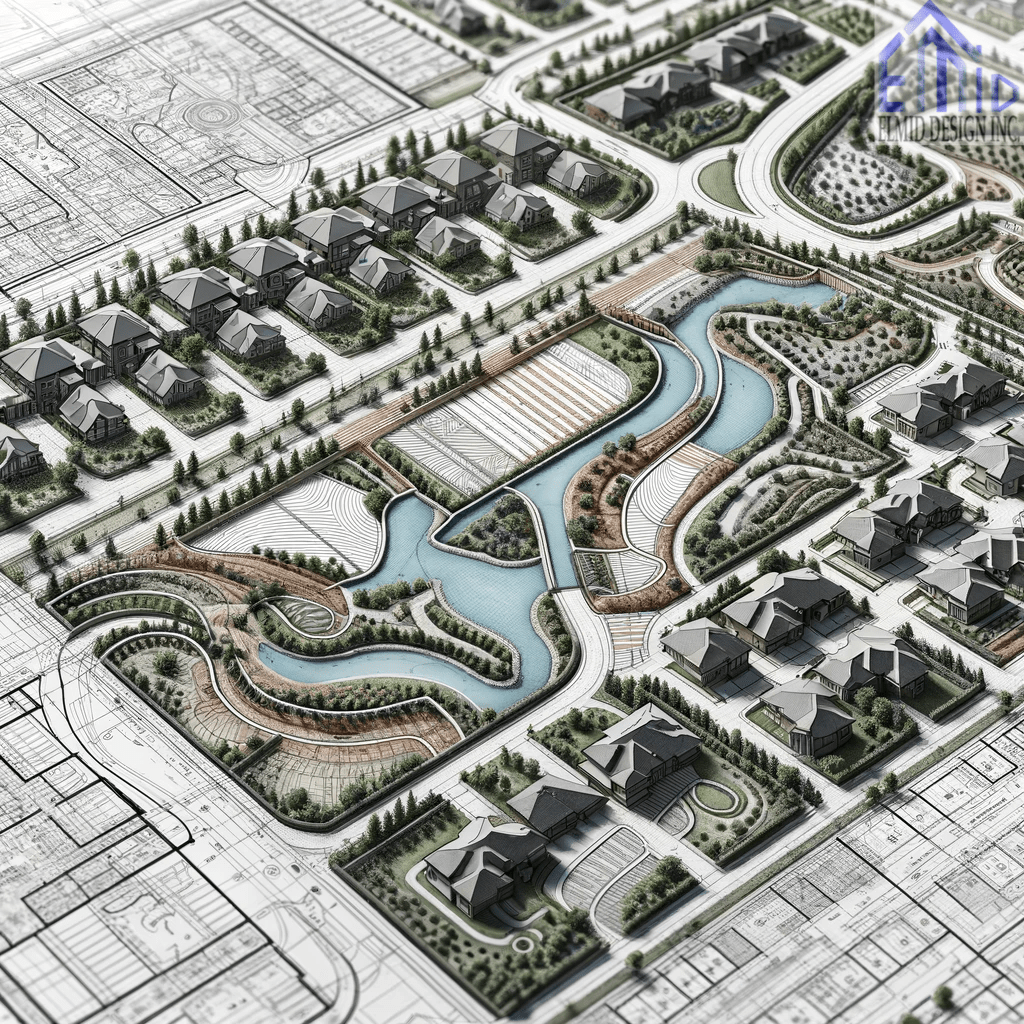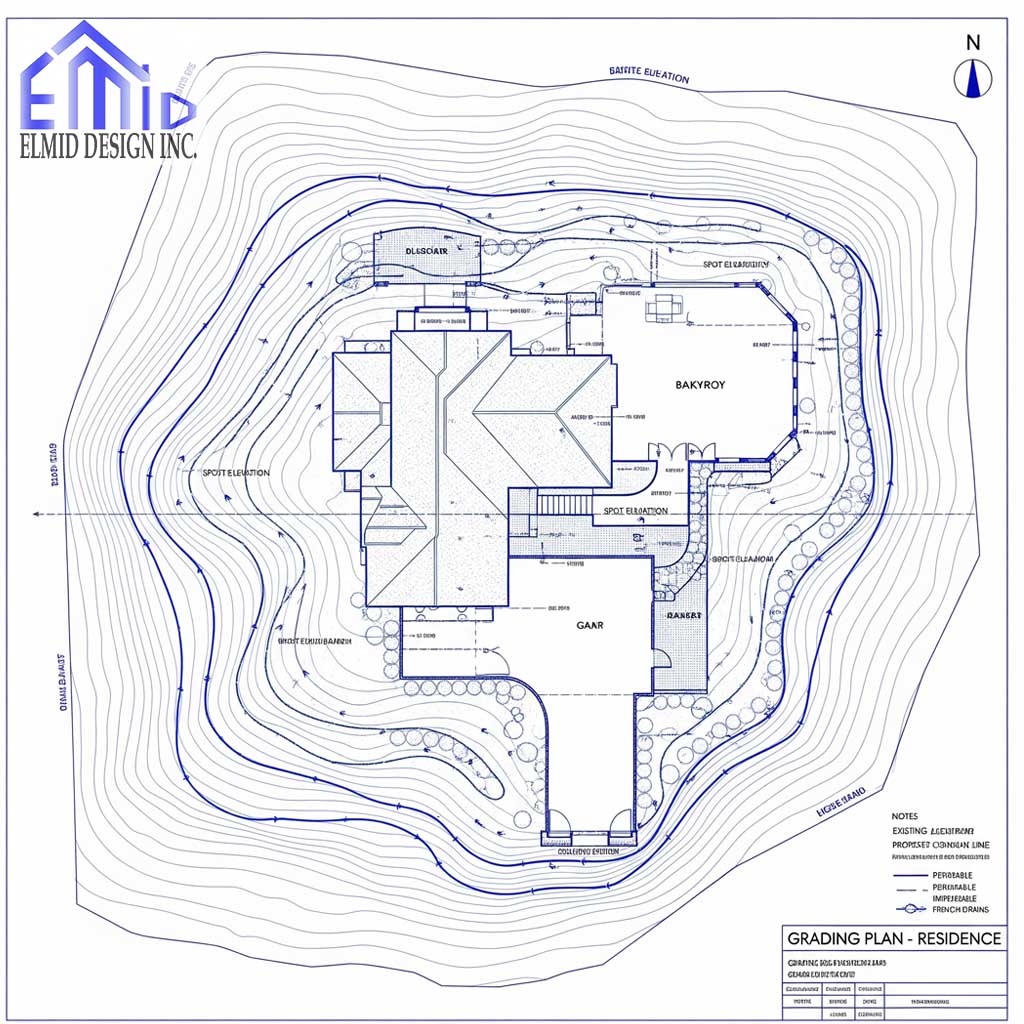A grading plan Brampton is a mandatory requirement for residential, commercial, and subdivision projects in the city. It shows how land will be shaped to direct water safely away from buildings and toward approved drainage systems. Without an approved grading plan, building permits cannot move forward and projects face costly delays. The City of Brampton enforces strict guidelines to protect properties, municipal infrastructure, and the environment from drainage failures. These standards ensure safe water flow, prevent erosion, and safeguard long-term property value. This article explains what a grading plan is, how Brampton regulates submissions, which components are required, and why compliance is critical. It also highlights how Elmid Design Inc, a PEO-certified engineering firm, delivers precise, permit-ready grading plans that meet city requirements and accelerate approvals.
What Is a Grading Plan in Brampton?
A grading plan in Brampton is a technical drawing prepared by a licensed professional engineer. It shows existing ground elevations and proposed changes that control how water drains across a property. The plan identifies swales, catch basins, driveway slopes, and finished foundation grades to ensure water flows away from structures. In Brampton, grading plans are required for new homes, infill developments, subdivisions, and major renovations. The City reviews each plan to confirm compliance with its Residential Surface Drainage Lot Grading Guidelines. These requirements protect both homeowners and neighbors by ensuring water does not cause flooding or property damage. A grading plan forms part of the building permit package, and without approval, no construction can begin.
Brampton’s Regulatory Framework
The City of Brampton has established a clear regulatory framework for grading plans. Developers must submit plans that comply with the Lot Grading Guidelines, which define how surface drainage must function for residential and commercial properties. In many cases, a Lot Grading Certificate is required after construction to confirm that the site matches the approved design. For projects involving major land alterations, a Site Alteration Permit must also be obtained before grading or fill placement begins. These rules prevent uncontrolled drainage, soil erosion, and damage to municipal services. Professional engineers licensed by Professional Engineers Ontario are responsible for preparing or reviewing all grading plans to guarantee accuracy and accountability. Brampton’s strict framework ensures sustainable growth while protecting property owners and public infrastructure from costly water management problems.
Essential Components of a Brampton Grading Plan
A grading plan Brampton submission must include specific components to gain approval. Elevations from a topographic survey show the current land levels, while proposed elevations indicate how the property will change after construction. Drainage flow arrows map how water will travel across the site. Swales are labeled with slopes to demonstrate compliance, and driveway grades are clearly marked. Retaining walls and catch basins must also appear when required. In addition, the plan includes erosion and sediment control details to protect the environment during construction. A proper legend, scale, and north arrow make the plan clear and measurable. Each element provides municipal staff with evidence that the site will function safely and efficiently. When prepared properly, the plan serves as both a regulatory document and a construction guide, ensuring consistency between design and execution.
Why Compliance Matters in Brampton
Compliance with grading standards in Brampton is critical for developers and homeowners alike. Non-compliant plans are rejected, delaying permit approvals and construction timelines. Even if construction moves ahead without proper grading, the risks are severe. Poor drainage can damage foundations, cause basement flooding, and erode landscaping. It can also push water onto neighboring properties, leading to disputes and potential legal claims. Municipal infrastructure may also be harmed by improper drainage, increasing repair costs for the city. Compliance ensures that projects protect property values, meet environmental standards, and follow sustainable development practices. For developers, adhering to Brampton’s rules reduces costly revisions and site corrections. For homeowners, it guarantees a safe and stable property for years to come. Meeting compliance standards is not optional—it is the foundation of responsible construction in Brampton.
How Elmid Design Inc Ensures Compliance
Elmid Design Inc is a PEO-certified engineering firm that specializes in grading plan Brampton projects. Their team understands the city’s guidelines and prepares plans that meet municipal requirements with precision. Using advanced CAD and GIS tools, they create detailed drawings that anticipate potential issues before submission. They also work directly with Brampton’s municipal staff to resolve concerns quickly, reducing the need for multiple revisions. Their certification from Professional Engineers Ontario guarantees professional oversight and accountability for every project. Developers and homeowners who choose Elmid Design Inc benefit from faster approvals, reduced delays, and long-term site protection. The firm’s expertise in grading, drainage, and compliance ensures that each plan supports safe development while protecting property investments. Elmid Design Inc is trusted in Brampton for delivering high-quality grading plans that pass review the first time.
Key Takeaways
A grading plan Brampton is essential for safe, compliant, and successful development. It defines elevations, drainage flows, and erosion controls to protect both private properties and municipal infrastructure. Brampton enforces strict guidelines through Lot Grading Certificates and Site Alteration Permits to ensure accountability. Compliance reduces risks, protects property values, and speeds up approvals. Developers and homeowners benefit from working with licensed professionals who understand municipal requirements. Elmid Design Inc offers PEO-certified expertise, advanced tools, and direct coordination with city staff to deliver permit-ready plans. For any project, from a single-lot home to a subdivision, a well-designed grading plan is the key to long-term success in Brampton.

Challenges in Brampton Grading Plan Projects
Developers in Brampton often face challenges when creating grading plans due to the city’s detailed requirements. Infill developments require careful alignment with existing drainage systems on neighboring properties, making design adjustments complex. Subdivision projects must integrate stormwater management ponds and erosion controls, which demand precise coordination. Retaining walls can complicate plans further, as they require additional certification. Seasonal conditions, including heavy rain and freeze-thaw cycles, also affect slope stability. Small errors in elevation data or drainage arrows often result in municipal rejection. These challenges highlight the need for professional oversight. By anticipating complications and preparing detailed, accurate submissions, engineers reduce risks. Elmid Design Inc addresses these challenges with advanced modeling and municipal collaboration, ensuring plans pass reviews with minimal revisions.
Case Study: Infill Grading Plan in Brampton
A recent infill project in Brampton demonstrated the importance of a detailed grading plan. The developer sought to build a new home on a lot within an established neighborhood. The existing drainage patterns were fixed, and nearby homes left little flexibility for slope design. The initial plan failed because it directed runoff toward an adjacent property. Engineers revised the design by adding a swale along the lot line and adjusting driveway slopes to guide water toward the municipal system. After resubmission, the plan received approval, allowing construction to begin without delay. This case shows how quick revisions and professional engineering expertise solve common issues in infill development. Elmid Design Inc supports developers in similar projects by preparing compliant, permit-ready plans that align with Brampton’s strict standards while protecting neighboring properties.
Best Practices for Developers in Brampton
Developers in Brampton can improve approval success by following key best practices when preparing grading plans. Accurate topographic surveys should be completed before design begins to ensure correct elevation data. Proposed slopes must direct water away from buildings while connecting smoothly to municipal outlets. Foundation heights should remain elevated above finished grade to prevent infiltration. Pre-consultation with Brampton staff helps clarify requirements before formal submission, saving time and reducing revisions. Using licensed engineers ensures accountability and compliance with professional standards. Elmid Design Inc applies these best practices by combining local regulatory knowledge with technical precision. Their expertise allows developers to submit plans with confidence, knowing they meet Brampton’s grading guidelines. By following proven methods, developers avoid unnecessary delays, improve efficiency, and protect both properties and communities from drainage risks.
Post-Construction Validation and Lot Grading Certificates
In Brampton, the grading process does not end with municipal approval of the plan. Once construction is complete, inspectors verify that site grading matches the approved design. This inspection ensures slopes, swales, and elevations function properly and direct water safely away from buildings. Developers must then obtain a Lot Grading Certificate, confirming the property complies with municipal standards. If discrepancies are found, corrections must be made before occupancy is granted. Retaining walls may require separate certification to ensure structural safety. Elmid Design Inc supports clients during this stage by conducting field verification and preparing final certification documents. Their involvement ensures projects move smoothly toward closure without costly rework. Post-construction validation is essential for safeguarding property value and meeting municipal expectations for long-term site stability in Brampton.
Stormwater Management in Brampton Grading Plans
Stormwater management plays a central role in every grading plan Brampton project. The City requires designs to account for heavy rainfall and runoff, ensuring water flows safely into approved drainage systems. Engineers incorporate swales, catch basins, or stormwater ponds depending on the property’s size and location. Failure to address stormwater results in rejected applications and costly redesigns. Developers must demonstrate how water will be retained, slowed, or redirected to avoid flooding. Elmid Design Inc integrates stormwater modeling into each grading plan, balancing municipal requirements with environmental responsibility. Their designs protect properties while ensuring Brampton’s infrastructure operates efficiently. By planning stormwater control early, developers achieve smoother approvals and safeguard communities against long-term water risks.
Zoning Impacts on Grading Plan Brampton Projects
Zoning by-laws in Brampton directly shape how grading plans are designed and approved. Each property falls under specific zoning rules that determine setbacks, lot coverage, and building placement. These rules influence drainage patterns, swale positions, and driveway slopes. For example, residential zones require particular separation distances to ensure water does not affect neighboring lots. Commercial or industrial zones often demand more extensive stormwater solutions. Ignoring zoning during design often leads to rejection, even if the technical plan appears accurate. Elmid Design Inc incorporates zoning analysis into every submission, ensuring compliance from the start. Their proactive approach reduces costly revisions and accelerates municipal approvals. By aligning grading plans with zoning requirements, developers create projects that satisfy both functional needs and regulatory expectations.
How Grading Affects Landscaping and Property Value
Grading impacts far more than drainage in Brampton. A well-executed grading plan ensures stable ground for landscaping features like gardens, patios, and driveways. Proper slopes prevent erosion and eliminate standing water, protecting vegetation and hardscaping investments. Homes with effective grading maintain higher property values because they remain free from flooding issues and water damage. Poorly graded lots, however, face ongoing maintenance challenges and diminished resale appeal. Municipal inspectors also review landscaping integration during plan approval, ensuring future stability. Elmid Design Inc prepares grading plans that balance technical drainage requirements with landscape design goals. Their approach allows homeowners to enjoy safe, attractive properties while developers benefit from enhanced project value. Grading, when properly managed, supports both practical needs and long-term financial growth in Brampton.
Technology’s Role in Modern Brampton Grading Plans
Modern technology has transformed how grading plans are prepared in Brampton. Engineers use drones to collect detailed topographic surveys, capturing precise elevation data quickly. Advanced CAD and GIS software then simulate drainage flows and slope stability, identifying potential problems before submission. These tools reduce human error, improve clarity, and streamline communication with city staff. Approval times often shorten when plans include accurate models supported by measurable data. Elmid Design Inc integrates these technologies into every project, delivering transparent and efficient designs. Their reliance on digital tools ensures grading plans are precise and compliant with Brampton’s expectations. Developers benefit from reduced delays and smoother reviews. By embracing innovation, grading plans in Brampton achieve higher accuracy and reliability, reinforcing trust between engineers, municipalities, and property owners.
Conclusion
A grading plan Brampton forms the backbone of every safe and compliant development. It ensures proper drainage, supports stormwater management, and aligns with zoning regulations. Developers who neglect grading risk costly delays, disputes, and long-term property damage. Compliance with Brampton’s standards protects both private investments and public infrastructure. Elmid Design Inc stands out as a trusted partner, offering PEO-certified expertise, advanced technology, and proven municipal knowledge. Their approach delivers accurate, permit-ready grading plans that streamline approvals and protect property value. Whether for a residential build, infill project, or subdivision, a properly designed grading plan guarantees long-term safety and success. By working with experienced professionals, developers in Brampton ensure their projects meet both immediate requirements and future sustainability goals.
FAQs About Grading Plan Brampton
Why does Brampton require grading plans?
The City requires grading plans to manage surface water safely, protect properties, and maintain municipal infrastructure.
Can homeowners prepare grading plans themselves?
No, only licensed professional engineers can prepare or review grading plans to ensure compliance and accountability.
What role does stormwater management play in grading?
Stormwater management prevents flooding and protects communities by ensuring runoff flows safely into approved systems.
Why choose Elmid Design Inc for grading plan Brampton services?
Elmid Design Inc offers certified expertise, advanced tools, and local knowledge, helping developers secure faster approvals and lasting protection.
How does zoning affect grading plans?
Zoning rules determine building placement, setbacks, and drainage allowances, which directly influence grading designs.

Elmid Design Inc: Trusted Experts in Grading Plan Brampton
Elmid Design Inc is a PEO-certified engineering firm specializing in grading plan Brampton projects. Their team delivers precise, permit-ready designs that comply with the City of Brampton’s strict drainage and zoning standards. By combining advanced technology with proven engineering expertise, Elmid Design Inc ensures faster approvals, reliable compliance, and long-term property protection. Developers and homeowners trust their professional knowledge, accountability, and commitment to quality, making them the leading choice for grading plan services in Brampton.
Geographic Locations That We Service:
Our Licensed Professional Engineers specializing in Engineered Site Grading Plans offer the best-engineered site grading plan, lot grading and erosion plan, and drainage plan to obtain site plan approval and building permits in Ontario, including a wide range of municipalities. Each area boasts unique features and requirements, making our tailored approach essential for success.
Toronto and Surrounding Areas
In the vibrant heart of Ontario, we service Toronto (City of Toronto) and surrounding areas. Additionally, we cover Oshawa (City of Oshawa), Pickering (City of Pickering), and Clarington (Municipality of Clarington). Furthermore, our expertise extends to Ajax (Town of Ajax), Whitby (Town of Whitby), Brock (Township of Brock), Scugog (Township of Scugog), and Uxbridge (Township of Uxbridge).
Halton Region
Moving to the Halton Region, our services encompass Burlington (City of Burlington) and Halton Hills (Town of Halton Hills). Also included are Milton (Town of Milton) and Oakville (Town of Oakville).
Peel Region
In the Peel Region, we provide services in Brampton (City of Brampton), Mississauga (City of Mississauga), and Caledon (Town of Caledon).
York Region
Our services in the York Region cover Vaughan (City of Vaughan), Aurora (Town of Aurora), and East Gwillimbury (Town of East Gwillimbury). We also cater to Georgina (Town of Georgina), Markham (City of Markham), Newmarket (Town of Newmarket), Richmond Hill (City of Richmond Hill), Whitchurch-Stouffville (Town of Whitchurch-Stouffville), King (Township of King), and Bradford-West Gwillimbury (Town of Bradford-West Gwillimbury). Each municipality here offers a distinct setting, requiring our specialized approach.
Other Southern Ontario Cities and Towns
We also serve many other cities and towns in Southern Ontario. These include Hamilton (City of Hamilton), St. Catharines (City of St. Catharines), Niagara on the Lake (Town of Niagara on the Lake), Brant (County of Brant), Cambridge (City of Cambridge), Kitchener (City of Kitchener), Waterloo (City of Waterloo), and Woodstock (City of Woodstock). Furthermore, we operate in Guelph (City of Guelph), Centre Wellington (Township of Centre Wellington), Shelburne (Town of Shelburne), Orangeville (Town of Orangeville), New Tecumseth (Town of New Tecumseth), Essa (Town of Essa), Collingwood (Town of Collingwood), Wasaga Beach (Town of Wasaga Beach), Barrie (City of Barrie), Midland (Town of Midland), Orillia (City of Orillia), Ramara (Town of Ramara), Minden Hills (Town of Minden Hills), North Kawartha (Town of North Kawartha), Kawartha Lakes (City of Kawartha Lakes), Peterborough (City of Peterborough), Selwyn (Town of Selwyn), and Brighton (Municipality of Brighton).




